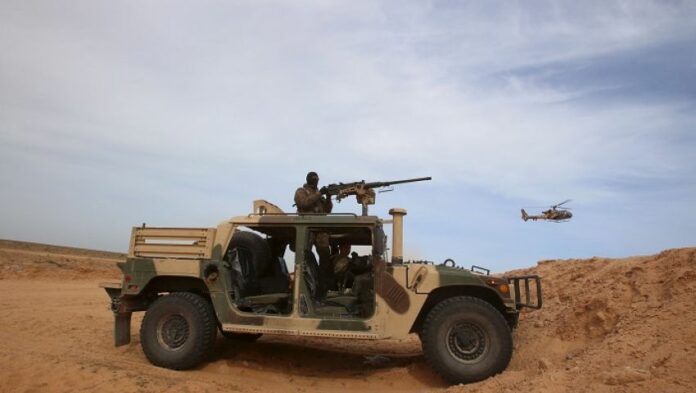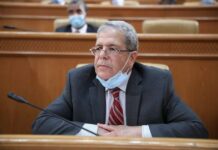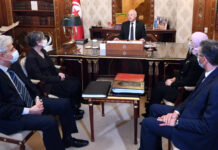The return of the specter of terrorist threats on the Tunisian-Libyan border once again prompted the country’s authorities to refuse to open the border with Libya.
Last Friday, President Kais Saied spoke of plans for assassination, murder and bloodshed. It was also reported in press reports that a “lone wolf” was arrested while preparing to carry out a terrorist attack targeting President Saeed during a visit that he apparently intended to make to a coastal city. In this context, Tunisia tightened its security and military measures on its southeastern border with Libya and closed it completely.
On Saturday evening, a copy of a letter from the Libyan Interior Minister Khaled Ahmed Al-Tijani Mazen was leaked. The letter was sent to the director of the Criminal Investigation Agency, the director of the Department for Security Operations, the director of the General Administration of Central Support, the security directors of Zuwara, the Western Coast and Al-Ajailat, in the west of the country, and the director of the Information and Security Follow-up Office. And it was intended to take the necessary security measures in cooperation with each other and intensify search and investigation operations, information gathering, monitoring, follow-up and coordination to thwart any attempt to carry out any terrorist act.
In his speech, the minister relied on a telegram received by the Arab and International Criminal Police Office at the ministry from Interpol of Tunisia stating that about 100 terrorists present at the Al-Wattia air base in its wing adjacent to the Tunisian Ben Guerdane region intended to infiltrate Tunisia.
The Libyan Minister of Interior addressed the Director of the Arab and International Criminal Police Office in Tripoli in response to the Tunisian Interpol letter (a second letter dated August 22):
“All the responses were unanimous in denying the authenticity of the information absolutely, given that the air base is under the control of the Libyan Ministry of Defense, and it cannot be allowed in any way to be a starting point for carrying out sabotage terrorist acts that would destabilize security and stability in our country and harm neighboring countries.”
He added, “With this, you must be informed, in order to respond to Interpol Tunisia, the source of that information, that what was reported is incorrect, and that we, on our part, follow up accurately and monitor terrorist activity in all its forms and pursue all those involved and those around whom suspicions hover through our counter-terrorism agencies.”
On Friday evening, the Tunisian president spoke about the presence of those who are planning assassination and murder, and addressed them: “I tell them I know what you are contemplating, I fear only God, Lord of the worlds, and despite their desperate attempts that reach to thinking about assassination, murder and bloodshed, I will move as a martyr if I die today or tomorrow to the other side of existence is with the fairest of the just.”
Al-Wattia Air Base, adjacent to the common border between Tunisia and Libya, has been under the control of the Turkish forces for more than a year after the withdrawal of the Libyan National Army from it. Several militias and battalions of foreign mercenaries are active next to it, most of whom are of Syrian nationality.
In July 2020, the Syrian Observatory for Human Rights revealed that Turkish intelligence transferred hundreds of militants from terrorist organizations, most of whom hold Tunisian citizenship, from Syrian territory to Libya.
The observatory stated that the Turkish intelligence transferred more than 2,500 members of ISIS who hold Tunisian citizenship to Libya on the orders of the government of President Erdogan, but Libyan sources confirmed that a large part of those terrorists had returned to Tunisia, and hundreds of them remained moving in the mercenary camps in the Libyan west, and receiving salaries from government authorities through Turkish agents.
The Libyan political researcher, Faraj Zaidan, explained that “Turkey brought Tunisian terrorists to the Al-Wattia military base that it occupies, and their number is now more than two thousand,” and said that “there are economic and intelligence aspects behind the closure of the borders between Tunisia and Libya.”
Zaidan added, “It seems that the Tunisian intelligence has knowledge of this, it may be through a penetration of text messages within the suspected groups within some Tunisian groups bordering Libya.”
What increases the Tunisian side’s fears is the presence of press reports and statements from Libyan personalities talking about the resurgence of ISIS terrorist activity in western Libya, especially in the city of Sabratha, which was home to dozens of Tunisian terrorists, a number of whom were killed as a result of an American air strike on February 19, 2016 on a residential complex in which they were holed up on the outskirts of the city, and among the dead were elements who were preparing to participate in the terrorist attack on Ben Guerdane on March 7, 2016, which led to the death of fifty-five people, including thirty-six terrorists, twelve from the army and security forces, and seven civilians.
According to Tunisian circles, it was one of the neighboring countries that informed the Tunisian authorities of the existence of movements of active terrorist elements in the western Libyan regions bordering with Tunisia to carry out aggressive operations in response to the measures taken by President Kais Saied on the twenty-fifth of last July, which Al-Ikhwan Al-Muslimeen ( the Muslim Brotherhood) and their allies see as both In Tunisia or Libya, a blow to their project in the two countries and in the region as a whole.
Observers believe that any terrorist movements from western Libya to target the security and stability of Tunisia may not be surprising. Among the reasons is the position of the Libyan Brotherhood, which is hostile to President Kais Saied and against the exceptional measures taken by him on the twenty-fifth of last July. A number of the leaders of the Libyan political Islam movement considered Saied’s decisions a coup against the legitimacy and the constitution, which is the same position taken by official Turkish authorities and within the ruling Justice and Development Party.
Observers add that Al-Wattia base is under the control of the Turkish regime and not the Libyan Ministry of Defense, as stated in Minister Mazen’s message, and even if it is under the influence of the Libyan Ministry of Defense, it is not far from the Turkish Brotherhood alliance. This prompted the Joint Military Committee to demand the Presidency Council, the House of Representatives, and the National Unity Government Presidency to appoint a minister over it instead of being managed by Abdelhamid Dbeibah, the prime minister.
Libyan journalist Mahmoud Al-Misrati said, “After the pressures he was subjected to, Mr. Mazen denies the presence of terrorists in Al-Wattia, and even goes to say that it is affiliated with the Ministry of Defense, which is handled by Dbeibah, but in order to relieve him of responsibility, he also implicitly confirms that Al-Qaeda, including Syrian mercenaries, is financed by the Ministry of Defense. And this is one of the reasons that prompted 5+5 to demand the appointment of a defense minister in order to cut off the funding of all mercenaries.”
The spokesman for the Libyan Army Command, Major General Ahmed Al-Mismari, confirmed the existence of a close link between the extremists stationed in western Libya and the terrorists in Tunisia, pointing out that the close link resulted in the formation of camps to train Tunisian terrorists inside Libyan territory to carry out terrorist operations, both in their countries or in countries experiencing armed conflicts.
The head of the National Defense and Security Committee in the House of Representatives, Talal Al-Mihoub, said that the Libyan border with Tunisia is under the control of armed elements, which facilitates the movement of terrorist elements between the two countries.
He added, in press statements Monday, that “it is natural that extremist elements are present in western Libya and under the auspices of political Islam groups,” stressing “full solidarity with the Tunisian people and their leadership in the war against terrorism.”
A member of the House of Representatives, Ali Al-Takbali, accused a Libyan official, whom he described as “the big one,” without naming him, in planning the assassination of the Tunisian president. He added, “Don’t blame Tunisia for closing the borders, but blame the caricatures that rule you.”
Member of the State Consultative Council Said Ben Charrada also expected the entry of terrorists through Libya into Tunisian territory after the recent events in Tunisia, and explained that the entry of these elements may be with the help of Tunisian parties rejecting the measures taken by President Kais Saied. He pointed to the possibility that some countries supporting these parties were behind the transfer of terrorist elements through Libya to Tunisia.
Last Friday, Kais Saied, by a presidential order issued in the Official Gazette, extended the declaration of the southern border triangle as a buffer border zone for an additional year, starting from the twenty-ninth of August, in continuation of the decision issued since 2013.
On Sunday, he announced a complete closure of the Ras Al-Jdir and Dhiba-Wazen border crossings with Libya, despite the efforts of the Libyan authorities to open them. The security authorities justified their position by the health measures taken to prevent the spread of the new Corona virus.
The Libyan Prime Minister, Abdelhamid Dbeibah, announced last Tuesday that the land borders between Libya and Tunisia would be opened and returned to normal, but the Tunisian authorities did not respond, and then the Minister of Foreign Affairs of the Government of National Unity Najla Mangoush made two phone calls with her Tunisian counterpart Othman Jerandi to inquire about the circumstances of the continued closure of the border crossings from the Tunisian side.
Mangoush informed Jerandi of the suffering of Libyan and Tunisian citizens alike, especially the sick, according to what was reported by the official page of the Libyan Ministry of Foreign Affairs.
The Tunisian minister explained that they have no objection to reopening the crossings if they receive a notification from the scientific committee concerned with confronting the Corona virus, and that the continuation of their closure aims to protect the citizens of the two countries in order to prevent the high rates of the spread of the pandemic in the two countries.
Observers in the two countries believe that the Tunisian decision to completely close the crossings, even if it appears due to health measures, reflects fears of unregistered terrorists infiltrating the country.
The Tunisian newspaper “ Chourouk” quoted security sources saying, “A person from those called ‘lone wolves’ (…) was preparing for an assassination targeting the President of the Republic, Kais Saied, in one of the coastal cities, since he was going to visit that area.” Other reports supported the news, and said that the aforementioned terrorist had set up in Turkey and infiltrated Tunisia with a forged Libyan passport.
Translated by Bechir Moussa
According to Al-Arab Newspaper https://bit.ly/2UFnfpq











